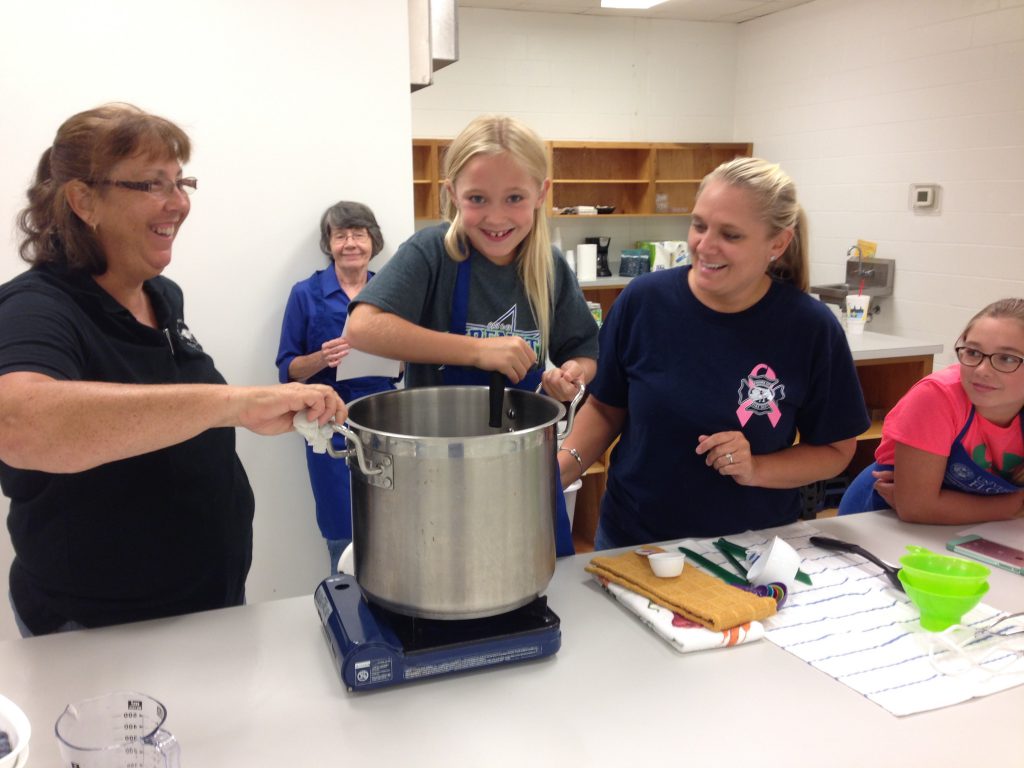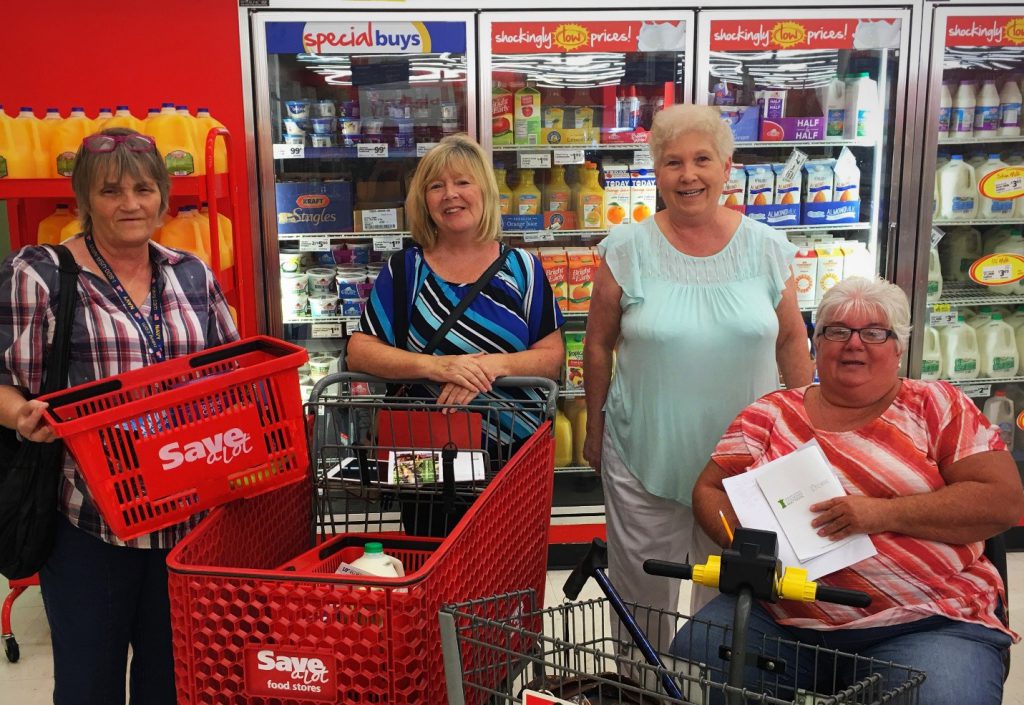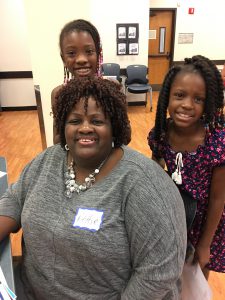by Melanie Taylor | Jul 8, 2018

Youth learn food preservation skills. Photo source: Melanie Taylor
At this point in the summer, many parents are at a loss for what to do to keep their children engaged and “off the couch.” How about a focus on healthy eating and food preservation? If you have a backyard garden be sure to pick the fruits and vegetables at their peak readiness. If you do not have a garden make a family trip to the local farmers market and/or a local u-pick farm.
Of course, fresh fruits and vegetables are full of nutrition and taste, but if you have or buy more than your family can eat in a few days’ time, be sure to make preparations to teach your children how to preserve those foods to eat later in the year. There is nothing more enjoyable than having fruit jam on biscuits or summer vegetables in your soup during the cold depths of winter.
There are six different methods of food preservation to teach your children. They are boiling water/water bath canning, making jam, pickling, freezing, drying, and pressure canning. The easiest method being freezing and the most complex and time consuming being pressure canning. No matter which ones you choose to teach your children be sure to follow valid recipes and procedures. Family and Consumer Science Extension Agents always recommend using the most current recipes and procedures from The National Center for Home Food Preservation, which are maintained at https://nchfp.uga.edu/. The National Center for Home Food Preservation is your source for current research-based recommendations for most methods of home food preservation. The Center was established with funding from the Cooperative State Research, Education and Extension Service, U.S. Department of Agriculture (CSREES-USDA) to address food safety concerns for those who practice and teach home food preservation and processing methods. Many of the recipes are available for free on the website, or you can order the 6th edition of the “So Easy to Preserve” food preservation book at https://setp.uga.edu/.
Specific to children, there is also a Put It Up! Food Preservation for Youth curriculum through the University of Georgia, which is a series of informal educational lessons that guide youth to explore and understand the science of safe food preservation. This free curriculum can be found online at https://ugeorgia.ca1.qualtrics.com/jfe/form/SV_a5Y4IfBZ2Vh0EIt after a quick questionnaire of how you plan to use the curriculum.
Teaching these food preservation skills to your children will be a fun-filled and very educational opportunity. Be sure to use the above resources to assist you in the food safety methods to be certain your products are safe for consumption. Enjoy this special time in the garden and kitchen with your children this summer.
Resources:
National Center for Home Food Preservation https://nchfp.uga.edu/
“So Easy to Preserve” https://setp.uga.edu/
Put It Up! Food Preservation for Youth https://ugeorgia.ca1.qualtrics.com/jfe/form/SV_a5Y4IfBZ2Vh0EIt


by Angela Hinkle | May 18, 2018

May is Older Americans Month – Photo credit: Wendy Meredith
“Grandparents Raising Grandchildren” are grandparents who are caregivers for their grandchildren. They have obtained temporary custody or have adopted because the grandchildren’s biological parents often are either incarcerated for crimes related to drugs and/or alcohol addictions or the parents are deceased due to their lifestyles and addictions. The UF/IFAS Escambia County Extension Expanded Food and Nutrition Education Program (EFNEP) has partnered with the Council on Aging in our area to work with these “great” grandparents. EFNEP is a series of nine lessons. We teach parents and grandparents raising grandchildren the knowledge, skills, and behaviors needed to raise healthy families.
What EFNEP Offers Grandparents Raising Grandchildren
Welcome!
Eating Smart Being Active. Tell us your story – we listen to you. We share helpful resources available in the county.
Get Moving!
Let’s Be Active. Learn Physical Fitness with Exercises and Games for the family. Drink Water.
Plan, Shop, and Save!
Plan for nutritious meals and recipes. Shop on a budget and save money.
Fruits and Vegetables Half Your Plate!
Make simple, family-friendly recipes using fruits and vegetables. Use all varieties including what’s in season and grown locally. Learn about important family vitamins, minerals, and dietary fiber.
Make Half Your Grains Whole Grains!
How many grains do I need a day? Why is it important to eat grains?
Go Lean with Protein!
What are animal proteins? What are plant proteins? How much protein do you need each day? What is a lean protein?
Build Strong Bones!
What are sources of low-fat or no-fat dairy? How many servings does your family need each day?
Make a Change!
What are good ways to get rid of too many fats, salts, and sugars from your families’ daily meals and snacks?
Celebrate!
Each EFNEP participant receives a certificate of completion to frame and hang in their home.
Why are Grandparents Raising Grandchildren?
The opioid epidemic is affecting so many families and, really, these folks should be enjoying retirement and their “Older Years.” We are here to supply grandparents who are raising grandchildren with education and tools that equip them to raise healthy and happy children.
EFNEP is here to help

Grandparents Shopping Healthy – Photo credit: Wendy Meredith
EFNEP aids in the challenge with recipes, activities, cooking skills, and researched info. Then we educate about nutritious foods, food safety, physical activity, and how to shop for food on a limited budget. We also provide fresh produce grown, harvested, and donated by the Extension Master Gardeners for in-class recipe tastings. We have, on occasion, taken the grandparents to a local grocery store to “put into action” what they have learned in the EFNEP classes. Each one is given a challenge to purchase a healthy item from each of the five food groups with money that is provided for them.
We also are currently working with Fresh Access Bucks (FAB), which enables us to share with our Grandparents Raising Grandchildren the locations and times of local Farmers Markets and Produce Stands that are FAB partners and accept SNAP and WIC when purchasing Fresh Florida Grown Produce.
Raising children can be hard in our younger adult years. Raising children in our “Older Years” can be extremely challenging, overwhelming, or downright exhausting. Through our partnership, we have been able to help the grandparents by eliminating some of their everyday stresses. We do this by offering them fun, factual, and fresh ideas about nutritious foods and how to prepare yummy, kid-approved snacks and meals. Working with the grandparents has been and continues to be very rewarding. They are always eager to learn and they are committed to the program. And they are so grateful for our involvement. The big smiles on the faces of the Super Grandmas and Super Grandpas say it all!!!

by Heidi Copeland | Sep 12, 2017
 For nearly 40 years, National Grandparents Day has been celebrated as an opportunity to express gratitude for all that grandparents do for families and communities. According to the U.S. Census Bureau Profile, America Facts for Features, in 1970, Marian McQuade initiated a campaign to establish a day to honor grandparents. In 1978, President Jimmy Carter signed a federal proclamation, declaring the first Sunday after Labor Day to be National Grandparents Day.
For nearly 40 years, National Grandparents Day has been celebrated as an opportunity to express gratitude for all that grandparents do for families and communities. According to the U.S. Census Bureau Profile, America Facts for Features, in 1970, Marian McQuade initiated a campaign to establish a day to honor grandparents. In 1978, President Jimmy Carter signed a federal proclamation, declaring the first Sunday after Labor Day to be National Grandparents Day.
Across the U.S., not only are grandparents appreciated for sharing their time, wisdom, and values, but they are currently stepping up to raise over 7.2 million children under the age of 18 whose biological parents are unable to do so, thus keeping the children out of the foster care system. In Florida, 11% of children live in homes where householders are grandparents or other relatives.
Locally, in Leon County, there are more than 2,000 grandparent-headed families, where:
- 13.1% of the grandparents are 60 years and older
- 39.8% of these families live below the poverty level
- Nearly 50% of these families have had the children for 5 or more years
The reasons as to why so many grandparents are raising grandchildren are many and varied. Nationally, substance abuse causes more than one third of this type of placement. Nevertheless, because of a grandparent’s selfless devotion and generosity to the needs of others, grandparents are, in fact, owed a great deal of thanks for their altruism.
As one grandmother exclaimed, “For my 50th birthday, I got a 2 year-old. My story isn’t unique.” In fact, grandparent roles in children’s lives are so significant that the Grandparents as Parents (GaP) Program of the Tallahassee Senior Foundation, funded by the Leon County Commission, grants, and donations, has a program and support group just for them! According to Karen Boebinger, GaP Program Coordinator, “The GaP program provides moral support and resource assistance to these grandfamilies who are trying to navigate through their new lifestyle.”
AARP® has streamlined the gathering of relevant information pertinent to this nationwide dilemma. The AARP® resource, Grand Families Fact Sheet, includes state-specific data and programs available, as well as information about public benefits, educational assistance, legal relationship options, and state laws. This fact sheet also contains many other resource tools such as the National Council on Aging’s questionnaire that helps grandparent caregivers and/or the children they are raising determine if they qualify for certain programs that pay for food, an increase in income, and/or home and healthcare costs. Once the questionnaire is completed, the website generates a list of eligible programs and contact information. (www.aarp.org/quicklink)
Take a moment today and every day to give thanks and appreciation for the thousands of grandparents in our community and around the country for the service they do for children. One thing is for certain: grandparents are more valuable to their grandchildren and communities than ever. Grandparents are indispensable and important people.
Want more information about supporting GaP or do you need support yourself? Contact Karen Boebinger, GaP Program Coordinator, at 850-891-4027 or karen.boebinger@talgov.com.

by Kendra Hughson | May 5, 2017

Family rituals and traditions, like family vacations, make lasting memories.
This will be my sixth Mother’s Day, so I am not an experienced mother by any stretch of the imagination. As a Family and Consumer Sciences Extension Agent, I am fortunate to have plenty of coursework and some practical experience in working with children– but real life is different. Here are a few of the things I have learned – from coursework and just a little bit of experience:
Every stage of childhood brings a new joy and a new challenge. Understanding child development can help parents know what to expect and how to handle challenges. Extension is a great resource for child development. We have fact sheets on all ages and stages of development. You can find them in our Electronic Data Information Source (EDIS) publications. Search them here: http://edis.ifas.ufl.edu/topic_child_development
Finding effective discipline techniques and sticking to them also is a challenge. Children need consistency. I have found that focusing on good behavior and having clear, consistent rules makes life much more peaceful. Now that my child is in school, we use a simple chart with just two or three items and use colored dots, similar to what my daughter is used to in school. This keeps it consistent and focused on the positive behaviors I want to see. My daughter is excited to earn privileges and the reward of good behavior dots or stickers. Our UF/IFAS Extension site has some great ideas for discipline too. Find them here: discipline resources.
Children need routines. I think adults do, too. Having a routine and sticking to it helps children know what to expect. Those family rituals and traditions are just as important for building family stability and a sense of belonging. They make for great family memories! Don’t forget to make time for bedtime stories, making cookies, or for family celebrations, like Mother’s Day.
I am not an expert at parenting. I have made mistakes, some big, some little. When I do need expert advice, I go back to what I have learned from my work in Extension. Extension has all the research-based information you can trust on parenting and a variety of other topics. Check it out: edis.ifas.ufl.edu.








